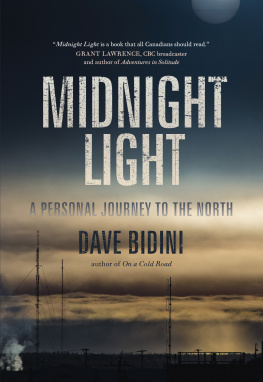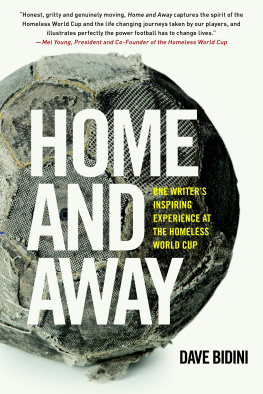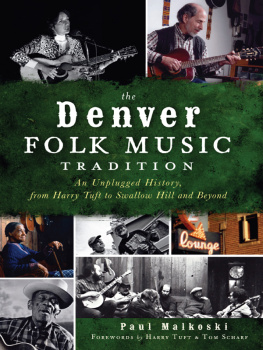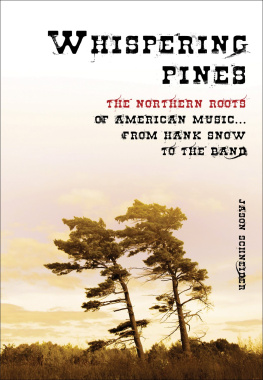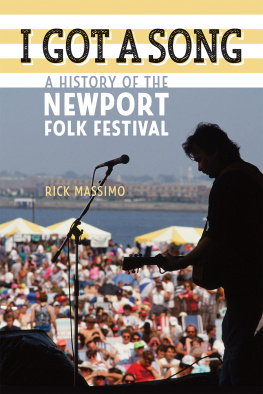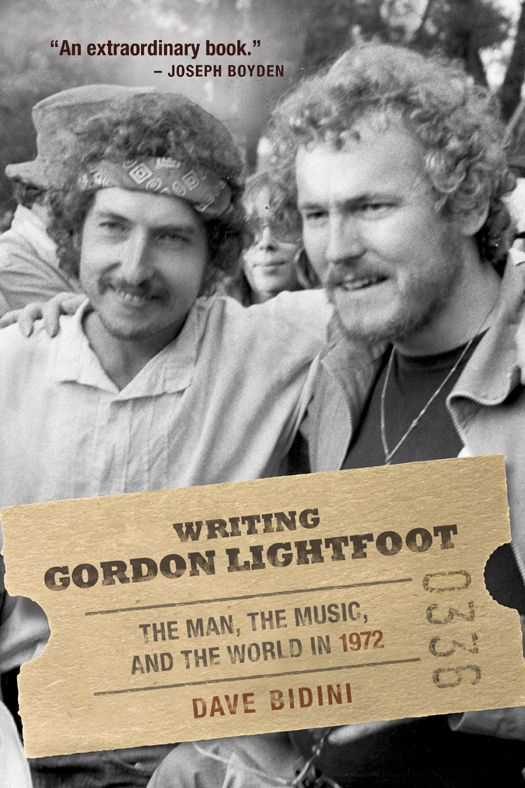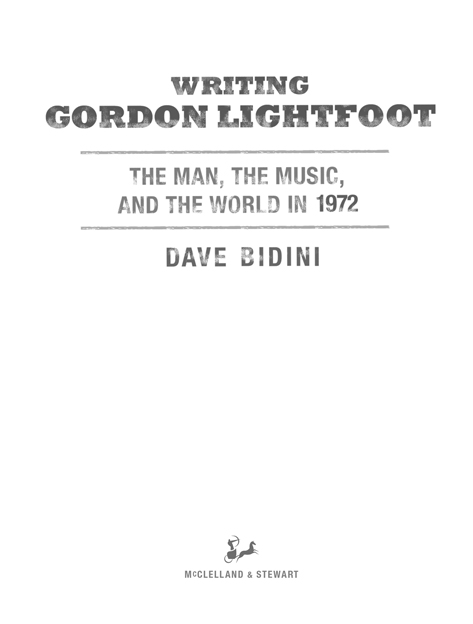OTHER BOOKS BY DAVE BIDINI
Home and Away
Around the World in 57 Gigs
For Those About to Write
The Five Hole Stories
The Best Game You Can Name
Baseballissimo
For Those About to Rock
Tropic of Hockey
On a Cold Road
Copyright 2011 by Dave Bidini
Cloth edition published 2011
All rights reserved. The use of any part of this publication reproduced, transmitted in any form or by any means, electronic, mechanical, photocopying, recording, or otherwise, or stored in a retrieval system, without the prior written consent of the publisher or, in case of photocopying or other reprographic copying, a licence from the Canadian Copyright Licensing Agency is an infringement of the copyright law.
Library and Archives Canada Cataloguing in Publication
Bidini, Dave
Writing Gordon Lightfoot : the man, the music, and the world in 1972 / Dave Bidini.
Includes fictional accounts.
eISBN: 978-0-7710-1259-4
1. Lightfoot, Gordon. 2. Lightfoot, Gordon Fiction. 3. Mariposa Folk Festival (1972 : Toronto, Ont.). 4. Folk festivals Ontario Toronto History. 5. Nineteen seventy-two, A.D. I. Title.
ML 420. L 724 B 58 2012 782.421620092 C 2012-901049-9
We acknowledge the financial support of the Government of Canada through the Canada Book Fund and that of the Government of Ontario through the Ontario Media Development Corporations Ontario Book Initiative. We further acknowledge the support of the Canada Council for the Arts and the Ontario Arts Council for our publishing program.
Published simultaneously in the United States of America by McClelland & Stewart, a division of Random House of Canada Limited, P.O. Box 1030, Plattsburgh, New York 12901
Library of Congress Control Number: 2012934079
Cover image: 1972 Bruce Cole/GetStock.com
Gordon Lightfoot graphic Morgan Narkiewicz
McClelland & Stewart Ltd.
75 Sherbourne Street,
Toronto, Ontario
M 5 A 2 P 9
www.mcclelland.com
v3.1
CONTENTS
Letter in Which I Ask You About
Playing Massey Hall and Stuff
Letter in Which I Ask You About
Track and Field and Rock and Roll
Letter in Which You Play a Resort
and We Meet a Ventriloquist
Letter in Which I Call You a Sell-Out
(Even Though You Are Not)
Letter in Which I Ask You About Dylan,
and in Which I Go on a Trip Up North
Letter in Which I Talk About
What Im Not Supposed to Talk About
The waves turn the minutes to hours.
GORDON LIGHTFOOT ,
The Wreck of the Edmund Fitzgerald
For my in-laws,
Mel and Norma
PROLOGUE
H ey, Gord. Or Gordon. Or Mr. Lightfoot. No, Im going to call you Gord, and I hope thats okay. You dont know me, but I know you. We all know you. Youre in our heads. Youre in the walls of our hearts. Your melodies hang and swerve over the great open skies and soupy lakes and long highways and your lyrics are printed in old history and geography and humanities textbooks that get passed down from grade to grade to grade. When people say Lightfoot, its like saying Muskoka or Gretzky or Trudeau. I dunno. Lightfoot. Your name says as much as these things, maybe more.
Gord, I am writing this book even though you wont talk to me. Its a long story, but this is a long book, so here goes. You wont talk to me because of a song that my old band covered, a version of your nautical epic, The Wreck of the Edmund Fitzgerald. Back in 1989, we contacted your late manager, Barry Harvey a good guy; at least he was to us to ask for approval, and he gave us his blessing. But then he said that he probably wouldnt play our version of the song for you. What he actually said was, If I play it for him, itll just piss him off. A few months later, something else happened, which is maybe the real reason why you wont talk to me. You see, after coming home from a tour of Ireland an ill-fated tour; we broke up there, only to re-form and record your song, though you probably wish wed stayed broken up a music writer asked about our rendition. Because I was young and dumb and feeling disappointed that you one of my heroes refused to recognize our interpretation of what is surely one of Canadas most famous, and best, songs, I punked out. I told him that, well, everyone knows that its based on an old Irish melody. Its not his, not really. What I didnt tell the writer was that a guy in a bar in Cork had told me this, nor did I tell him that there were several beers involved in Cork, Gord, this is a given. Later on, when Barry Harvey read what Id said, he asked me to recant my statement. I might have just grunted and hung up the phone. Barry asked again and again, and, having grown a little older and less punked-out, I said I would, but then the story appeared on the Internet (the goddamned Internet). Barry was gentlemanly about the whole thing, but he said that Id upset you, which is what Id wanted to do, at least in the beginning, but not anymore. You were mad and I dont begrudge you that feeling. After all, the same guy whod desecrated your song had called you a phony, even if he hadnt really meant it (Cork plus beer plus being rejected by ones hero plus an encounter with a drunken storyteller equals impetuous rant. Its a weak defence, I know, but its all Ive got). I tried taking the story down, then forgot about it. Barry called a third time, then a fourth time, asking nicely. Then he passed away. And now I am writing a book about you. And you wont talk to me.
Last year, when my publisher asked if I wanted to do this book, I explained the situation. He said, Do it anyway, and so we proceeded to figure out a way to create a book without the contribution of its central figure, which is you. At first, I thought about using stories that other people had told about you, but the biographical holes were too great (turns out youre a bit of a mystery, Gord, although its not like you dont know that). Then, as I started to look back through your life, I came across an event that I remembered reading about years ago in a Peter Goddard-edited seventies Toronto pop magazine called Touch. The event was Mariposa 72. Because it was a great event maybe one of the most important in Canadian musical and cultural history I was given a starting point from which to talk about your life, without actually talking to you. I also thought it might be a way of telling the story of Canada. But I tried not to think too much about it. Instead, I just sat down and started writing.
Gord, I know you know all of this, but, at this point, I should tell the readers a few things. Okay. Readers: the 1972 Mariposa Folk Festival (the sixteenth year of the event) was unlike any that came before it. It took place on a small isthmus at the bottom of Toronto, on Centre Island, now the site of a popular kids amusement park. At the time, Mariposa was one of the most progressive festivals of its kind only the Newport Folk Festival and a similar event in Philadelphia had better reputations bringing attention to marginalized folk, blues, and traditional music. It steered clear of emerging chart music pop and rock and even folk-rock instead scheduling time for forgotten blues masters, Inuit throat singers, and local tub-thumpers (Gord, I do not mean to disparage local folksingers by calling them tub-thumpers, but its kind of what they were. Still, I know that a lot of them are your friends, and I dont need to piss you off any more than you already are). In 1971, excitement over the event resulted in ticketless fans swimming across the harbour to get to the island, further dissuading organizers from booking big-name talent for fear that the grassroots festival would lose its way. Such was their monastic commitment to a toned-down event that, in 1972, evening performances were cancelled, in keeping with the philosophy established by artistic director Estelle Klein, who, in 1972, was out of the country, holidaying in Greece and taking a break from the festival.


